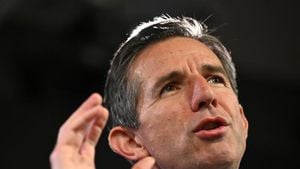The Mental Health Crisis Among Men Has Never Been More Urgent
Men's mental health is increasingly becoming a topic of focus as societal pressures push down on the emotional lives of men. Long associated with strength and stoicism, men are facing silent struggles with their mental health, which can lead to devastating consequences not only for themselves but for their families as well. With alarming statistics indicating men's higher rates of suicide and trauma-related disorders, it's clear there’s much to unpack about their experiences and the barriers they face when seeking help.
The impact of the pandemic on men's mental health is significant and cannot be overlooked. Take the story of Rajesh, for example, a 38-year-old marketing professional who lost his job during the height of COVID-19. Once the family's steady problem solver, Rajesh found himself grappling with feelings of inadequacy as his wife, Priya, took over household responsibilities. Priya remembers the chaos well: "He was angry all the time. He would yell at the kids, avoid family interactions, and we were no longer intimate. At first, I thought he just needed some time to bounce back," she shared. Things hit home for her when she found Rajesh crying and realized his mental health crisis was much larger than losing his job.
This situation reflects a broader pattern, where men often struggle with their identities when faced with changes, especially when roles within the family shift. Men like Rajesh might retreat as they battle feelings of shame, anger, or sadness, casting dark shadows over familial bonds. Rajesh and Priya’s tumultuous period lasted remarkably long, spanning nearly 18 months, until they decided to seek therapy together, which became a pivotal moment for healing.
Then there's Arjun, just 23 years old, who felt immense pressure to exemplify success for his family. Coming from a small town, the expectations placed upon him were akin to wearing heavy armor, leading to crippling anxiety and panic attacks. "When I started having panic attacks, my parents didn’t understand what was happening. One night, when I went to my father and told him I was not able to cope, my dad just told me to ‘man up!’" Arjun shared. Despite the seriousness of his condition, the stigma around mental health meant he believed he had to tackle this battle alone.
These anecdotes ring true across many households where men feel they must conform to societal standards of what it means to be masculine. Mohan, a 55-year-old teacher, expresses this idea poignantly through his struggles with undiagnosed PTSD stemming from his traumatic childhood experiences. "I feel like we are losing him, and it has started affecting our children too," reveals his wife, Rekha, illustrating how his inner turmoil cascades through every member of the family.
Dr. Deepika Majithia, MD, psychiatrist, sheds light on the troubling statistics surrounding men's mental health. According to the Accidental Deaths & Suicides in India 2021, men account for 72.5% of suicide victims—a disproportionate figure when compared to women—a reflection of how traditionally masculine traits are often equated with emotional suppression rather than healthy expressions of feelings. “The hesitation many men feel to seek help is deeply tied to societal expectations surrounding masculinity,” she explains. This stigma leads many men to self-medicate through destructive behaviors rather than addressing their emotional pain directly.
Breaking this silence could mean everything. Dr. Majithia believes, "No one should feel ashamed of seeking help. It can save not just an individual but their entire family." It's about creating environments where men can express vulnerability without fear of judgment. This responsibility falls not just on men but also on those around them—especially women. Women play a key role as emotional anchors within families and can lead by advocating for men's mental health, breaking the stigma one conversation at a time.
Despite the obvious need, why do so many men still disregard their mental health? The societal pressures to be stoic and independent often send men the wrong message—emotions signal weakness rather than being recognized as part of the human experience. The consequences of this ignorance are dire; research has shown men are significantly less likely to seek professional help, even when faced with debilitating mental health issues.
When talking about mental health, it isn’t just the men who suffer; families, partners, and children bear the brunt of emotional neglect. A supportive home environment can transition the mindset from feeling isolated to finding strength through dialogue. Based on Dr. Majithia's insights, companionship can be the tonic many men need to face their emotional struggles and heal. When men are encouraged to talk, it can initiate a cascade of healing within the household.
Real change begins with normalizing emotional expression, especially among young boys. How men are raised greatly influences their willingness to admit vulnerability later in life. That’s why breaking down these gender barriers early on is key. It’s imperative to teach young boys the value of sharing their feelings, showing them it's not only okay to speak up but courageous to do so too.
The broader community's role cannot be overlooked either. Public figures and role models sharing their mental health journeys can significantly impact societal perceptions. For example, athletes like Kevin Love and DeMar DeRozan have opened the door for more conversations within their respective communities, helping to encourage others to share their stories.
Now more than ever, the need to address this mental health crisis is evident. At its core, acknowledging these issues is pivotal. Men should recognize their struggles not as failures but as everyday human experiences, part of the broader spectrum of life. A simple yet powerful step forward is seeking help, whether through friends, family, or professional assistance.
Being vulnerable is not synonymous with weakness; it is, surprisingly, quite the opposite. Seeking help is not the end of masculinity—it marks the begining of real strength, one built on courage and the willingness to confront one's own issues. Mental health is not defined by gender, and no one is exempt from experiencing its challenges.
For men grappling with their mental health, they must know they are definitely not alone. It’s time to raise voices and share messages of hope—because it's perfectly okay to not be okay. Every small step we take toward open dialogue about mental health can help conquer the stigma surrounding it.
So, to all the men out there feeling the weight of the world on their shoulders: it’s time to lighten the load. Start engaging with your emotions and don’t hesitate to reach out for support. The change starts with us, and the ripple effect can be transformational.
Let's make mental health care accessible and normalize conversations surrounding it. By doing so, we pave the way toward healthier, more vibrant communities where men can flourish and support one another on their journeys to healing.



